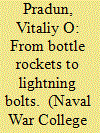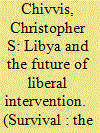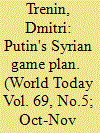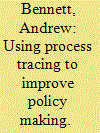|
|
|
Sort Order |
|
|
|
Items / Page
|
|
|
|
|
|
|
| Srl | Item |
| 1 |
ID:
110305


|
|
|
|
|
| Publication |
2012.
|
| Summary/Abstract |
In the United States, the decision to go to war has often been propelled by a singular event, a 'trigger' that both galvanises and unites, at least temporarily, the US Congress, the nation's press and the American public. The attack on Pearl Harbor precipitated US entry into the Second World War, and the attack on the World Trade Center on 11 September 2001 led to American military involvement in Afghanistan. In both instances, thousands of innocent Americans had been killed on American soil by an easily identifiable, foreign enemy. The United States entry into the Korean War resulted from a somewhat different kind of trigger. While US forces were not directly attacked, there was, as President Lyndon Johnson's Deputy Undersecretary of State George Ball once wrote, 'a massive land invasion by 100,000 troops … a classical type of invasion across an established border'. Ball argued that North Korea's invasion of South Korea in June 1950 provided 'an unassailable legal and political basis for counteraction'.
|
|
|
|
|
|
|
|
|
|
|
|
|
|
|
|
| 2 |
ID:
111119


|
|
|
|
|
| Publication |
2011.
|
| Summary/Abstract |
In March 1996, China conducted military exercises and live missile firings in the
Taiwan Strait as a response to the increasingly pro-independence stance of Taiwan's president, Lee Teng-hui. The United States responded in turn by maneuvering two aircraft carrier groups into the island's vicinity. China and the United
States did not come to a standoff, and the issue ended peacefully, although not
without ominous messages being received by all parties. China had signaled its
willingness to use military force to check Taiwan's incipient independence ambitions, and the United States had conveyed its resolve to defend Taiwan against
aggression from the mainland.
|
|
|
|
|
|
|
|
|
|
|
|
|
|
|
|
| 3 |
ID:
116646


|
|
|
|
|
| Publication |
2012.
|
| Summary/Abstract |
The tragic assault on the US consulate in Benghazi on 11 September 2012 raised new doubts about the wisdom of the 2011 intervention in Libya. But while the attack put a question mark over Libya's transition, it did not change the fact that the intervention had toppled Muammar Gadhafi and opened the door to a better future for the country. Without it, hundreds, perhaps thousands, of innocent civilians would have died and the wave of rebellion sweeping across the Middle East and North Africa would likely have been slowed. It was a genuine if moderate success for the North Atlantic Treaty Organisation (NATO), for the United States, and most of all for Libya and the Libyan people. Success, however, was the result of no small amount of good fortune, and it could prove very hard to replicate, so before applying its lessons to other cases (above all Syria), it is critical to assess what was and was not accomplished in Libya, and why.
|
|
|
|
|
|
|
|
|
|
|
|
|
|
|
|
| 4 |
ID:
112515


|
|
|
|
|
| Publication |
2011.
|
| Summary/Abstract |
Anti-ship ballistic missiles (ASBMs) are thought by many to be a "game-changer" for the People's Republic of China (PRC) in future military conflicts with the United States around Taiwan, but critics refute this "game-changer" notion. The arguments on both sides are myths. Missile defense cannot be one hundred percent effective in intercepting incoming ASBMs, and an aircraft carrier is bound to be spotted if it is going to be a useful war-fighting machine. Nonetheless, ASBMs do not change the game in the PRC's favor. Carriers are not crucial to a U.S. intervention. Other assets immune to ASBMs can Stop a military takeover of Taiwan. Sinking U.S. carriers would also be counterproductive for the PRC, as it would escalate a conflict which Beijing has little chance of winning.
|
|
|
|
|
|
|
|
|
|
|
|
|
|
|
|
| 5 |
ID:
128621


|
|
|
| 6 |
ID:
140398


|
|
|
|
|
| Summary/Abstract |
This article argues that applying the Bayesian logic of process tracing can improve intelligence estimates, appraisals of alternative policy options, and reassessments of whether policies are working as planned. It illustrates these points by demonstrating how more systematic use of this logic could have improved each of these three elements of policymaking regarding the 2003 US military intervention in Iraq.
|
|
|
|
|
|
|
|
|
|
|
|
|
|
|
|
|
|
|
|
|